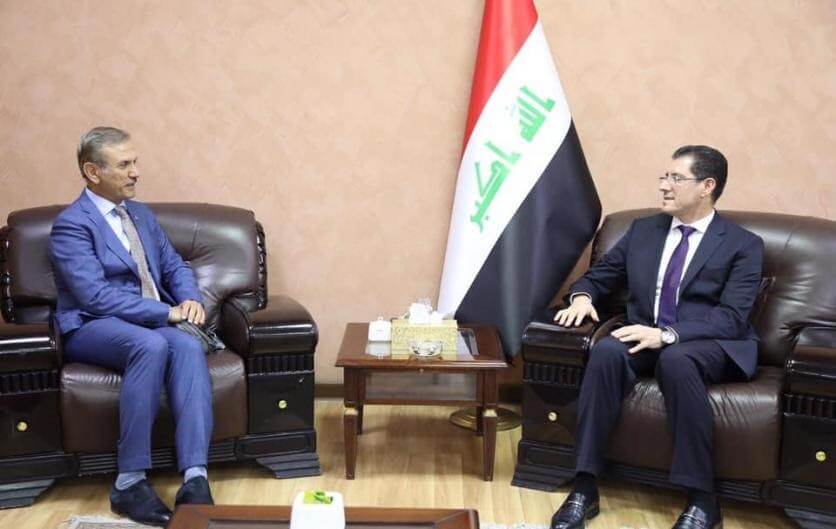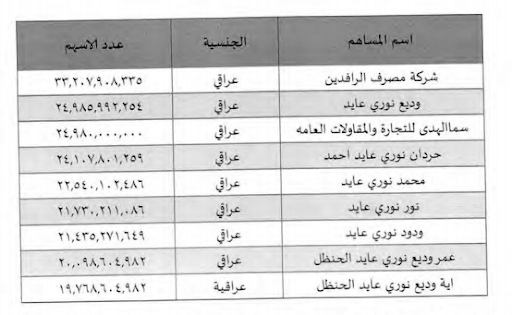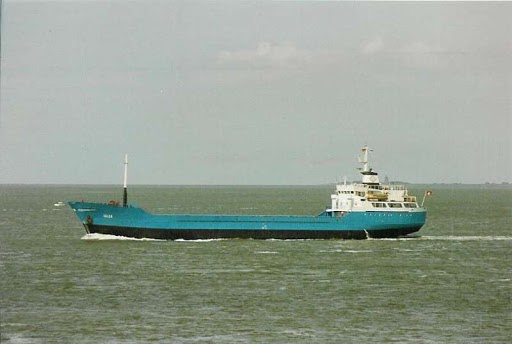A prominent Iraqi family with a history of helping former President Saddam Hussein procure illicit goods from the 1990s into the early 2000s maintains an active commercial network in the UAE, Jordan, Iraq, and Turkey.
The Al-Handal family helped Saddam skirt United Nations sanctions by smuggling goods via the Jordan-Iraq land crossing and by vessel from the UAE to southern Iraq.
This investigation highlights the efficacy of matching publicly released government documents with corporate records to track a known Saddam associate and smuggler who continues to grow business operations across the region. By mapping this familial network with links to Saddam and past sanctions evasion schemes, clients can better understand how to manage and ultimately reduce their exposure to risky networks
CIA Report Links Al-Handal to Saddam
The Al-Handal family was “closely tied to Saddam’s family and to the IIS [Iraqi Intelligence Services],” according to a public CIA report from 2004 on illicit finance and procurement. Al-Handal General Trading Company “received preferential treatment in the issuance of Iraqi procurement tenders. The head of the firm, Wadi Al-Handal, has established several subsidiary companies to facilitate acquisition of sensitive goods for Iraq.”
Iraqi Bank Records
What is known today as Al-Handal International Group was established by Nouri Ayyed Al-Handal in Baghdad in the 1940s. Currently, the company is headquartered in the UAE and maintains operations in Turkey, Iraq, Jordan, and most recently, Cyprus.
Wadih’s success in building on his father’s legacy makes him known today within the Iraqi elite. He has been interviewed by major news outlets and is often pictured with high-ranking officials.

Fig. 1: Wadih Al-Handal (left) with Iraqi’s Minister of Planning (right) in March 2019.
In post-2003 Iraq, open-source information and corporate records suggest that the influence of the Al-Handal family comes from its role in Iraq’s banking industry. Al-Handal International Group publicizes its role in establishing and controlling Ashour International Bank for Investment.
The Iraqi Securities Commission shows that the Al-Handal family established the bank in 2005 and as of 2018 maintained control over it. Seven of the top nine shareholders are members of the Al-Handal family. The other two shareholders are entities: Al-Rafidain Bank and Sama Al-Huda for General Contracting and Trading — the former has been sanctioned by the UN since 2004.
The Al-Handal family has also controlled banks without publicizing it. According to 2018 financial statements from Trust Islamic Bank, the Al-Handal family owned 50 percent of the bank. Trust Bank’s 2019 financial report did not list them.
Wadih also heads the Iraq Private Banks League, an interest group established in 2004 by representatives from the 19 private banks operating in the country at that time. Some of the league’s member banks also serve as board members, with Ashour International acting as president. Moreover, Arabic language sources commonly refer to Wadih as the head of the Iraq Private Banks.

The Al-Handal Family in Jordan
The Jordan Commercial Register lists Sabah as the 50 percent owner of Sabah Nouri Al-Handal And His Partner. Due to Jordanian regulations and Sabah’s Iraqi citizenship, he must not legally own more than 50 percent of the company, but he can de facto control, manage, and more generally lead the company. The company’s stated business purpose is trading in oil field supplies and petroleum products.
Ahmed Sabah Al-Handal, Sabah’s son and Wadih’s nephew, is the 50 percent owner of Al-Arabiya for Petroleum Supplies. He is also the general manager and the authorized signatory of the company, giving him control over all administrative and financial matters. Sabah is listed as an officer.
Al-Handal General Trading, named by the CIA as a front company, is also registered in Jordan, however the corporate record lacks details. It does not list a shareholder nor does it list a business purpose.
The corporate record does however provide other important insights. It lists the parent company as being Emirati, established in 1995, and with “3,000,000 in registered capital.” No currency is specified, but the record states that the capital is registered at the parent company, so it is likely 3,000,000 Emirati dirhams (roughly $816,782).
The Al-Majed Vessel
The UAE is home to the headquarters of Al-Handal International Group and was one of the main throughways for the Al-Handal-Saddam procurement network—in addition to the land route from Amman.
Wadih used a ship for transport between the UAE and Iraq’s southern port town of Al-Basrah. More specifically, the ship was berthed at Al-Hamriyah Port in the UAE.
Al-Jawhara Al-Khalajiya (Gulf Jewel) General Trading is one of Wadih’s front companies, according to the aforementioned CIA report. Public records from the UAE show a Jawharat Al-Khaleej (alternate spelling for Gulf Jewel) Shipping & Sea Cargo. UAE public records list Mohammed Al-Handal, Wadih’s brother, as the managing director with a 19 percent shareholding. The company’s license expired in 2017.
Jawharat Al-Khaleej Shipping was the commercial manager for a vessel named the AL MAJED from 2012-2015, according to Equasis, a maritime database. However, the registered owner in 2011 was Yousif Al-Ziyad, who is listed as operating on behalf of Jawharat Al-Khaleej Shipping.
The AL MAJED’s automatic identification system—a transponder-based tracking system used by ships—placed it at Al-Hamriyah Port in 2017, according to MarineTraffic. Furthermore, a third party website that provides details of companies operating in Gulf Cooperation Council ports lists a contact email for Gulf Jewel Shipping and Sea Cargo LLC: [email protected]. Public records list a Mohammed Naji as a member of the company’s board of directors, showing another potential link between Al-Handal and the vessel.
Public records confirm that the AL MAJED was decommissioned in India in 2016.

Fig. 3: A photo of the vessel, Talea, before her name change to the AL MAJED. Photo: Capt. Jan Melchers. Source: www.shipspotting.com
The Al-Handal Family Today
The family’s history of helping Saddam undermine international sanctions and its links to sanctioned banks today show that the ability to trace familial commercial networks by using reliable corporate records is essential in mitigating exposure to financial risk.